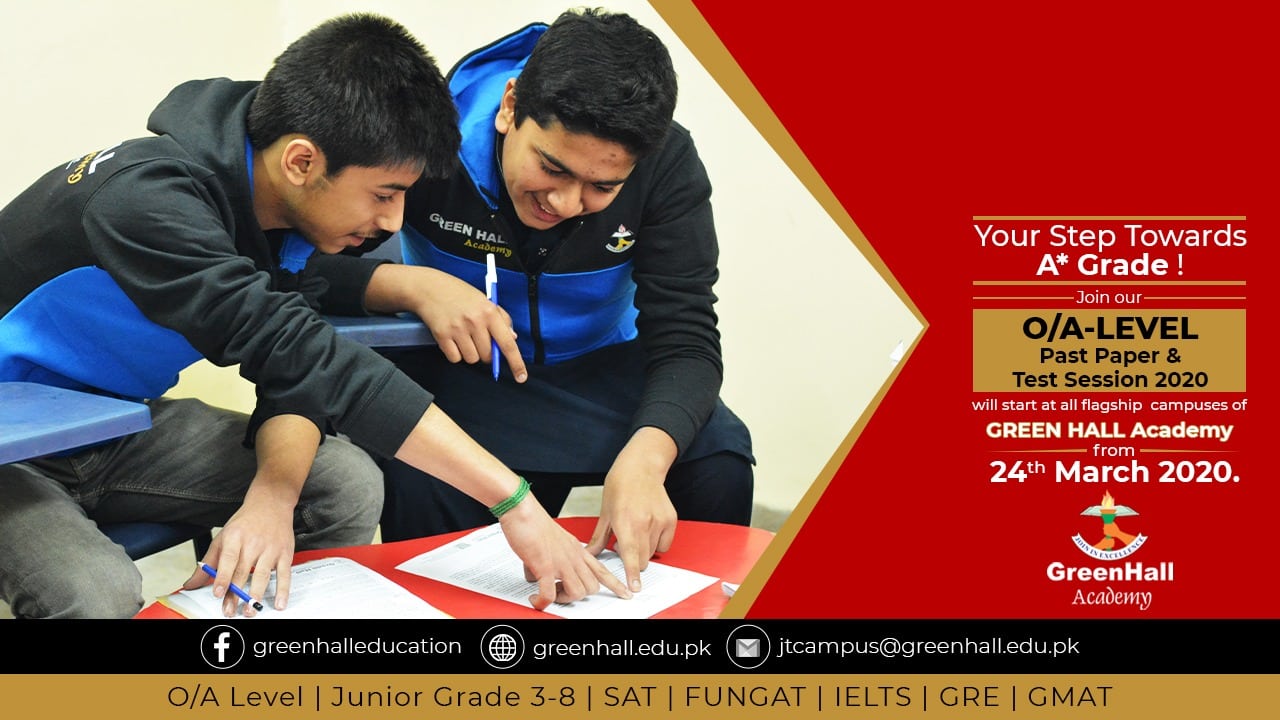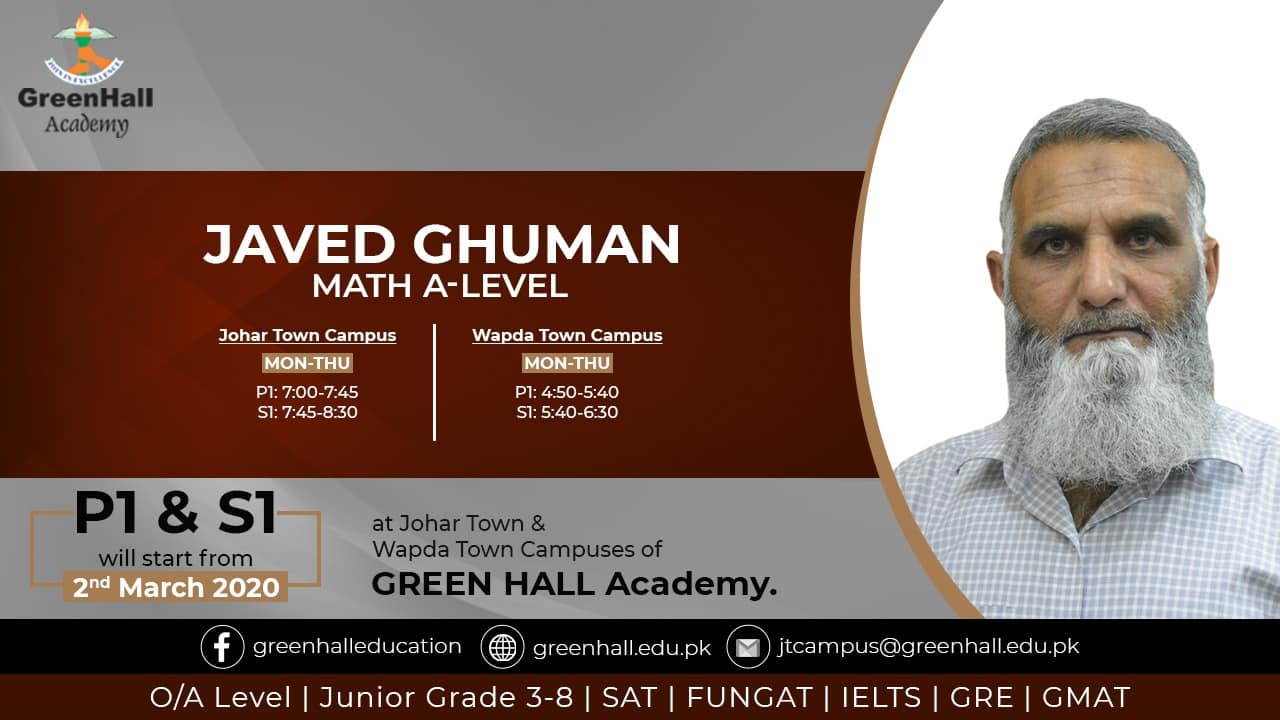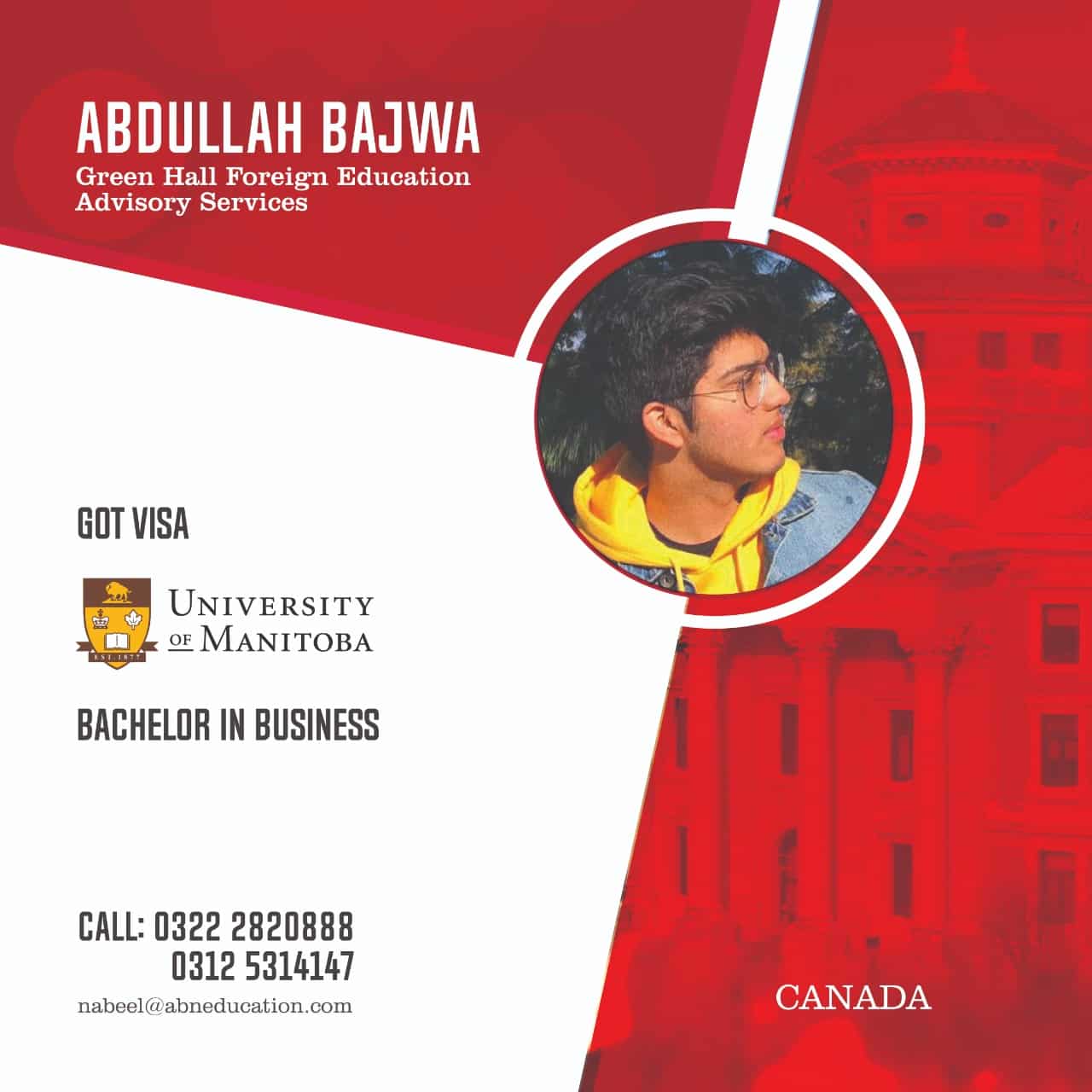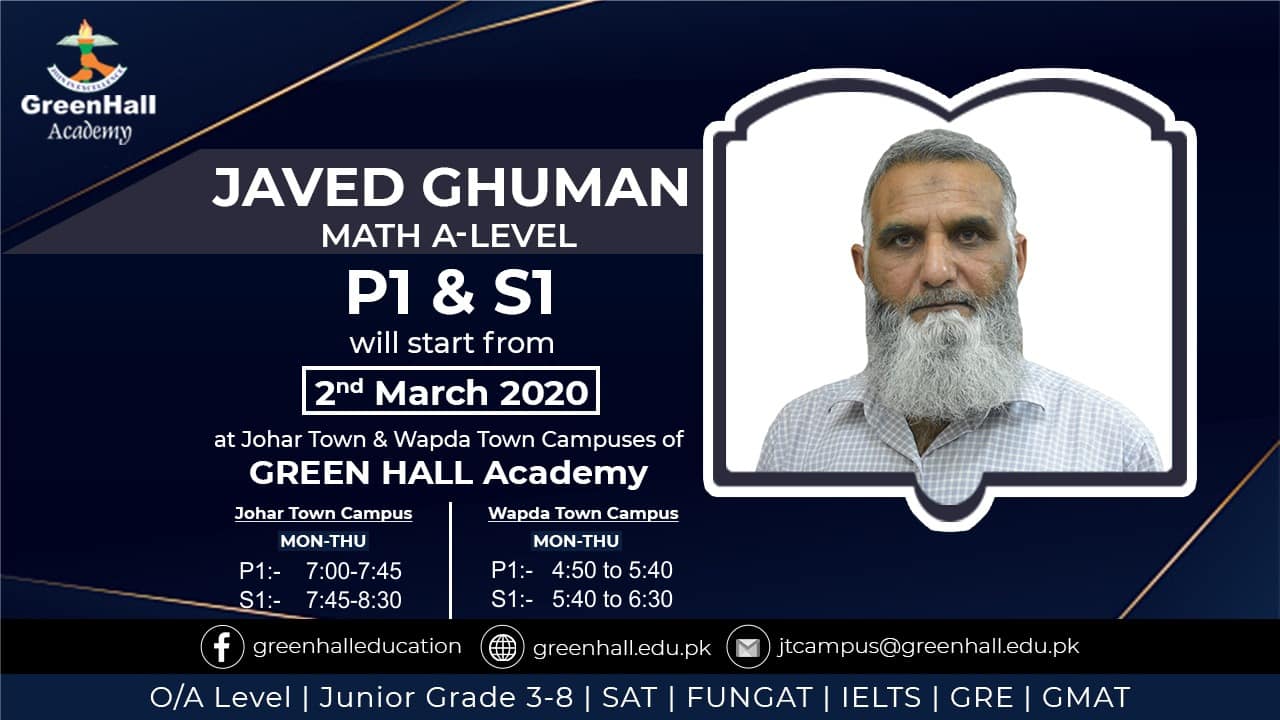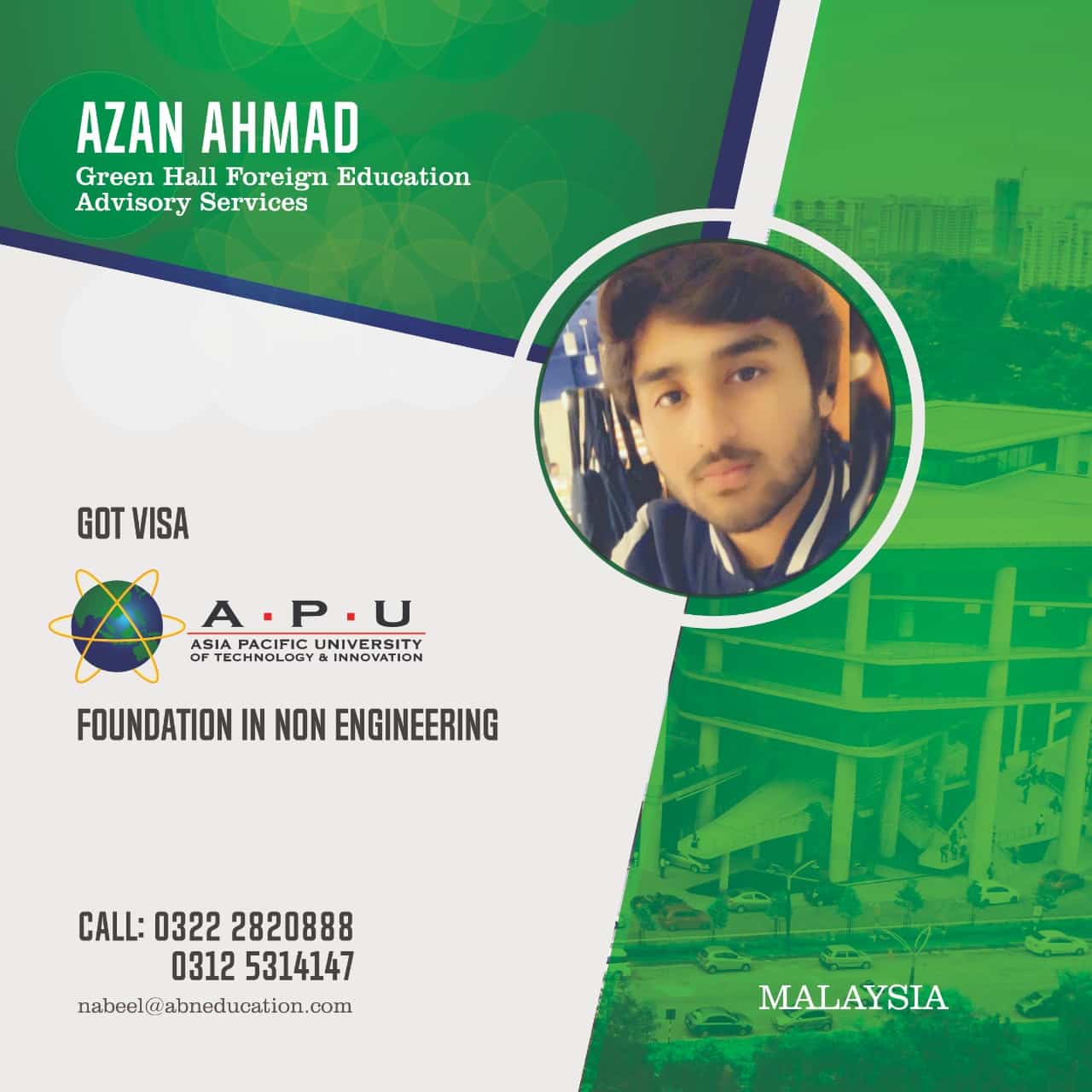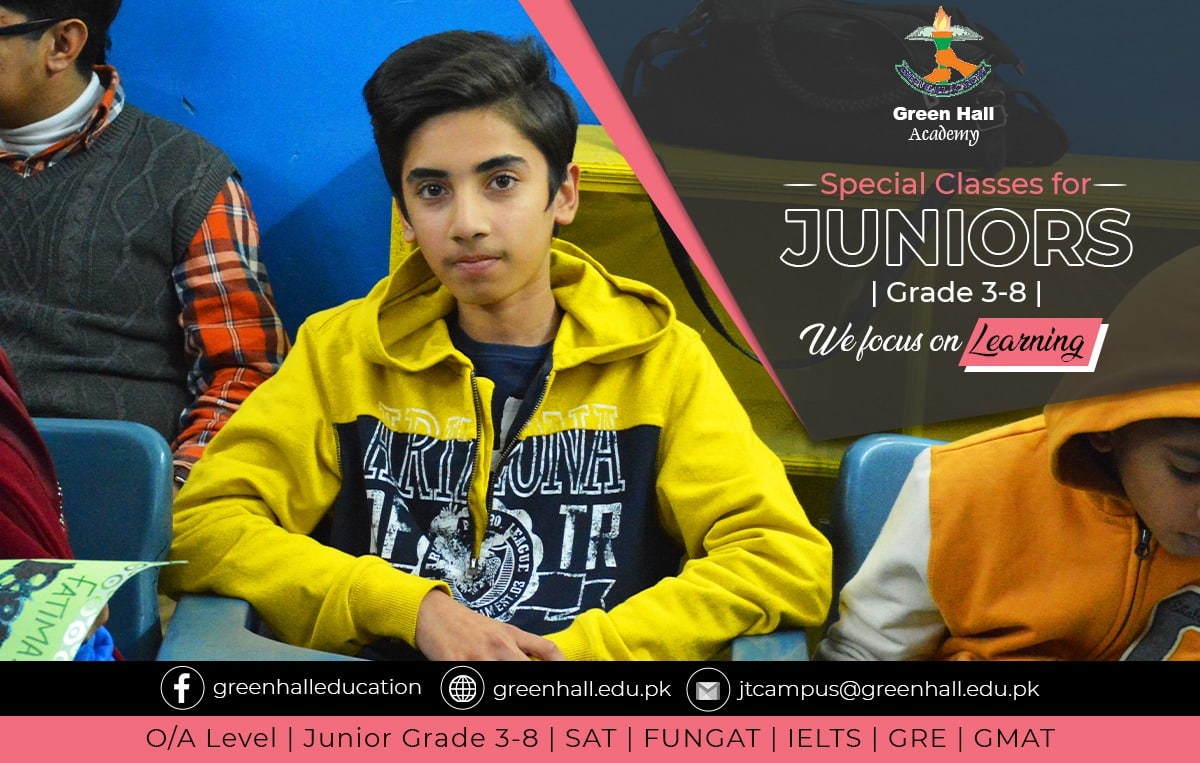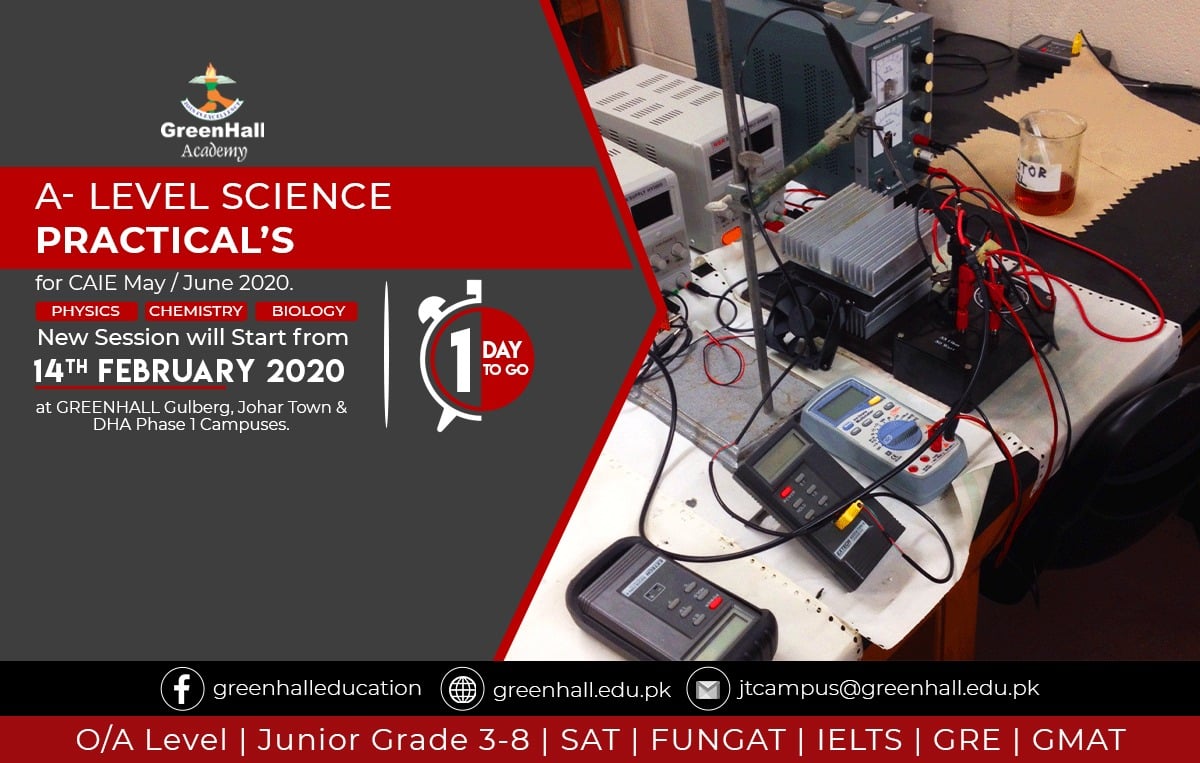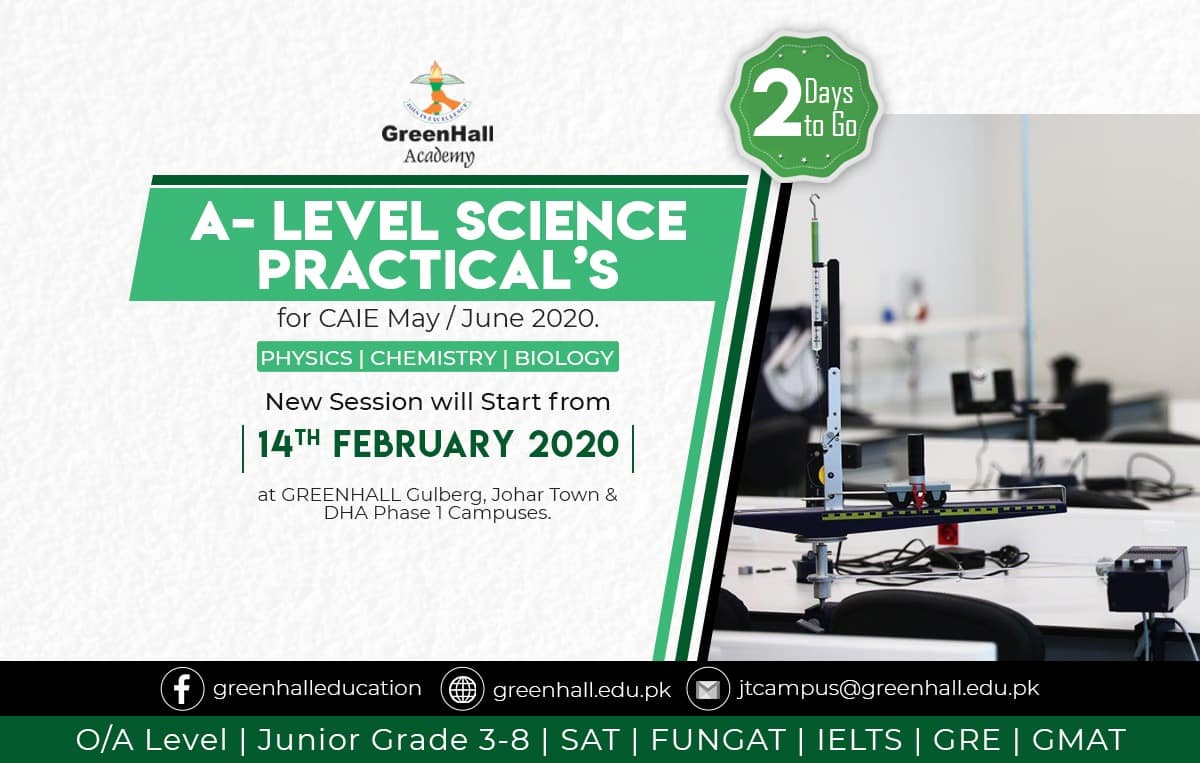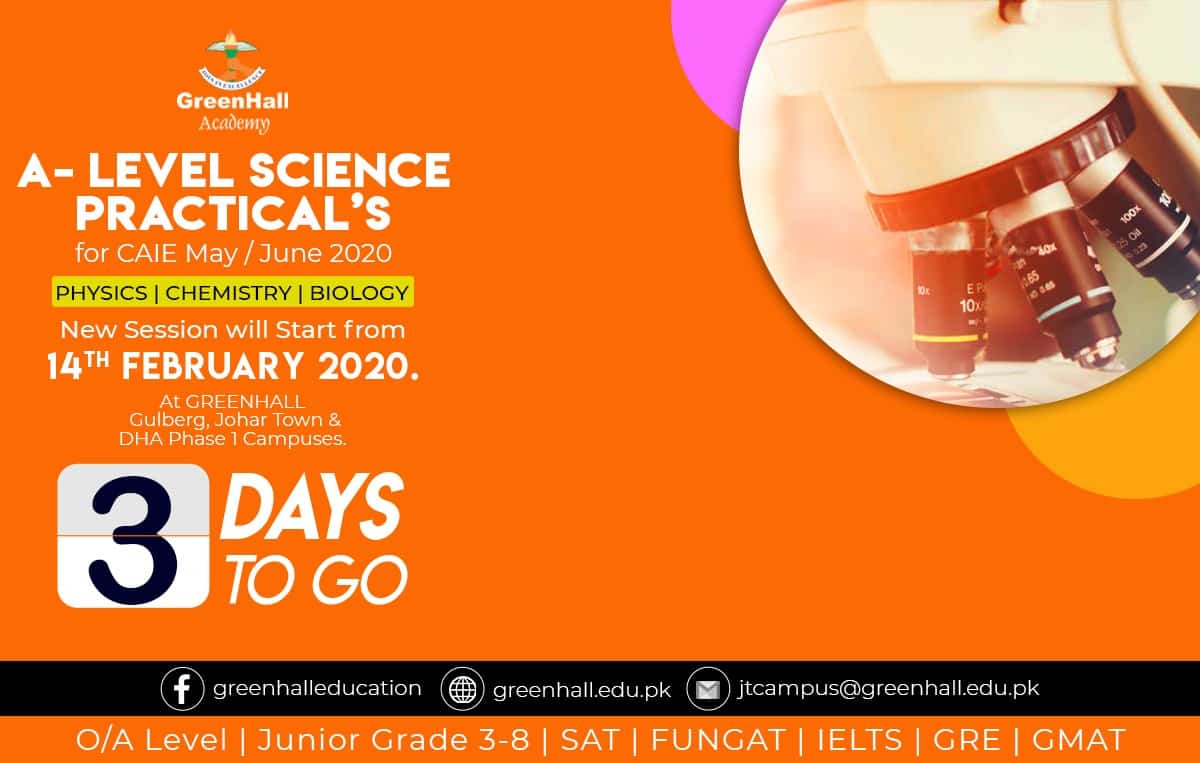AS & A-Level Science Practicals will start from Friday (14th February 2020) at GreenHall Academy Johar Town, Gulberg & DHA Phase 1 campuses.
Physics
What are the practical skills required for physics and why do you need them?
The practical skills involved are:
– manipulation, measurement and observation, the collection of simple data to an appropriate accuracy, choosing the right range and distribution of values
– presentation of data and observations in a table
– analysis, conclusions and evaluation, using and justifying the correct number of significant figures
– plotting of a graph and calculation of a gradient. In the second paper this involves the use of logarithms and plotting error bars on graphs
– estimating the uncertainties in measurements made and identifying the most significant sources of uncertainty
– calculating the uncertainty in the value of a calculated quantity made from two or more measurements each with their own uncertainty
– evaluation of the method involved and suggesting improvements
– planning an experiment, including identifying dependent and independent variables and quantities that remain constant, identifying any risks involved
Developing practical skills prepares students for studies beyond A Level in physics, engineering or in physics-dependent vocational courses. Practicals also help students develop abilities and skills that are useful in everyday life and encourage safe practice. These practical skills help to develop attitudes such as a concern for accuracy and precision, initiative, inventiveness and a spirit of enquiry.
These skills are important in employment and go far beyond mere knowledge of facts. A good practical course also helps to develop an interest in the subject of physics itself and complements the study of the theory, showing that scientific theory is ultimately grounded by experiment. The amount of practical apparatus required does not have to be enormous because working within the resources available is another useful ability. It’s important to remember that students can learn a lot from practical work that goes wrong as well as from experiments that work perfectly every time.
What are the main challenges for students carrying out practical work?
Many students at A Level may not have had much experience of practical work and may not consider themselves to be very ‘practical’, but there is no need to be afraid of simple experiments. Students need practice in setting up simple apparatus and to be happy in carrying out the experiment by themselves. When a student has enough experience of simple apparatus then they face the challenge of writing a method where they must choose the apparatus and method for themselves. This might be for an experiment that differs from any that they have previously seen and shows their inventiveness and initiative.
Students may also believe practical work to be a mathematical exercise where there is a right and a wrong answer. This is not the case. Every reading has an inherent uncertainty and students need to be happy to estimate uncertainties in simple quantities, such as the measurement of length and time by either repeating readings or taking the smallest scale reading on the instrument used. They also need to realise that the uncertainty is only an estimate and is itself not exactly known.
There are a few mathematical challenges, particularly for those not studying mathematics at A Level. These include the use of logarithms and combining uncertainties, where a real familiarity with percentages is a useful skill. However, the average student can learn the necessary skills with a reasonable amount of application.
What are your 5 top tips for students for practical work ?
1) Think actively about every topic. Do you understand what is going on? If not, then ask a question.
2) Know how to estimate uncertainty as the smallest scale division or, better, half the range in the readings.
3) After every experiment write down:
– the steps that you actually took during the experiment
– whether each quantity was dependent, independent or kept constant
– major difficulties
– improvements
4) Realise that readings in a table are measured, usually, to the same precision, i.e. to the same number of decimal places, but that calculated quantities should be given to the smallest number of significant figures in the quantities used in the calculation.
5) Take care when plotting graphs.
– does your graph cover half the page horizontally and vertically?
– does it have units on both axes?
– check your points are accurate
– use a long ruler when drawing a straight line
– show your working in finding the gradient
Chemistry
5 tips for students by GreenHall Academy
1) Remember that practical work is important;it is a component of your examinations. Therefore, make the most of whatever practical experience that you are given and don’t think of it as relaxation time away from theory work.
2) Remember that practical work is related to the rest of the syllabus. If you are not sure why you are doing the practical – ask your teacher to explain. When you are told that you will be doing a practical investigation, write down what you think are the aims of the practical work and what you hope to get from it.
3) If you have a practical partner, then agree responsibilities. For example, if you are measuring the rate of a reaction by following the change in the volume of gas produced, one of you can measure the time and help countdown to the next reading, while your partner can read the volume.
4) If you are going to do an assessed practical, then ask your teacher what criteria she or he is going to use when allocating the marks.
5) Try and maintain a good balance between your awareness of safety and a confident use of the apparatus. You should by now know how to use a Bunsen burner safely and the difference between gentle heating and strong heating, even some advanced level students think that gentle heating involves a yellow Bunsen burner flame. The practical workbook has a chapter on basic techniques. If this textbook is available, then take a look at this chapter.
Biology
What are the practical skills required for biology and why do you need them?
Before they can embark on AS & A Level practical work with confidence, students should be familiar with the use of a typical school laboratory. This includes things such as balances, measuring cylinders, beakers, pipettes (or syringes), heating apparatus and thermometers. It is also important that students know how to work safely when carrying out practical work.
A knowledge of basic biochemical tests such as the tests for starch, glucose, protein and lipids is useful as these are often revisited at AS & A Level. There is also an assumption that students are aware of simple tests from Cambridge IGCSE™ chemistry, such as using universal indicator paper and testing for using limewater to test for carbon dioxide gas. These chemical tests are often used when carrying out practicals at AS and A Level biology.
Students should also understand how to plan valid experiments with standardised variables and repeats. They should also know how to draw results tables that display data effectively. Evaluating the design of simple experiments, such as recognising the level of accuracy of equipment is also a useful skill to reinforce before AS & A Level. All these skills help to provide a good foundation upon which to build.
What can be the main challenges for students carrying out practical work?
For biology experiments, results can often be unpredictable! Living organisms often do not respond in the ways that we expect. For example, a piece of pond weed in an investigation into the effect of light intensity, may not photosynthesise due to several reasons. Students need to be patient, accept that all results are valid and explore the reasons for results not being as expected. Many students think that getting unexpected results is essentially the mark of a bad experiment – in reality, getting the ‘wrong results’ can be a learning experience in itself. Students should also not be scared to ‘have a go’ and be encouraged to try again if something did not seem to work first time.
What are your 5 top tips for students?
1) Be confident and keep trying even if a technique is difficult
2) Don’t expect results to always go the way you planned – remember that living organisms can be very different to one another
3) Work safely – always wear eye protection and risk assess everything
4) Be organised – keep all your equipment tidy on your bench
5) Enjoy practical work – it is your opportunity to apply your knowledge to the real thing
A-Level Science Practical’s will start from Friday (14th February 2020) at GreenHall Academy Gulberg, Johar Town & DHA Phase 1 campuses.
Registrations Open.
For Details:
GreenHall Academy Gulberg Campus:
<www.facebook.com/greenhallacademygc>0312-5314148,
GreenHall Academy Johar Town Campus:
<www.facebook.com/greenhallacademyjt> 0311-6333666,
GreenHall Academy DHA Phase 1 Campus:
<www.facebook.com/greenhallacademydhapase4>
:0331-5314143.
[Largest & Most Reputed Evening Coaching Network of O/A Level & Entry Tests Preparations]
#GreenHall #GreenHallAcademy #OLevel #ALevel #tuition #CAIE
#Science #Practical’s #Physics #Chemistry #Biology

